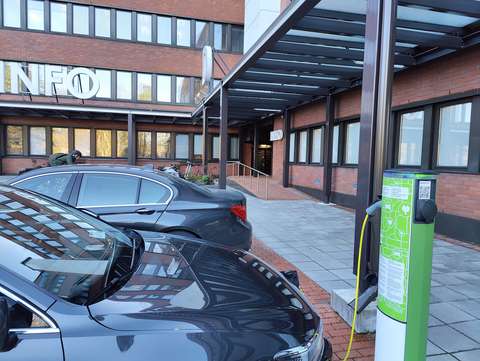Company bike to the office to get the most out of commuting
The COVID-19 pandemic taught the technology service company Etteplan about telecommuting and permanently reduced commuting and trips abroad.
Traffic accounts for one-third of Espoo’s greenhouse gas emissions. Commuting takes place every weekday, so the emissions are significant. Workplaces help to drive sustainable mobility as outlined in the Sustainable Espoo programme. This series of stories tells about actions by Espoo employers to cut emissions from commuting. Read the other stories in the series: Pastor rides a bicycle to work.
Etteplan provides industrial engineering services, software and embedded solutions and technical documentation. The company already employs around 4,000 people in eight countries. You would be forgiven to think that the employees of the publicly listed engineering consulting company would spend much of their working day driving a car or on an aeroplane on the way to global assignments.
However, the truth is quite different, as revealed by Outi Torniainen, the company’s Senior Vice President, Communications and Marketing.
“We are close to our clients. We have 30 branches in Finland alone,” Torniainen says.
The network-like corporate structure reduces the need for mobility dramatically. With the clients close by, people can choose to work in any of the company’s dozens of offices. The workplace moves flexibly with the employee if an Espoo resident working at Etteplan happens to be in Kuopio, for example.
“Especially during the coronavirus pandemic, people moved to the countryside or their old home region. Some moved to live permanently in their summer place. It reduces traffic to and from the summer houses on weekends,” says Outi Torniainen.
The pandemic changed mobility
Etteplan’s headquarters moved to Espoo just as the first wave of the COVID-19 pandemic began in the spring of 2020. The global pandemic has served as an effective smart commuting consultant.
“Whether we like it or not, it really affected commuting,” Torniainen says.
“Remote working is here to stay. It is also something that people have liked. It brings a lot of flexibility and enables combining work, leisure and family life.”
Mobility changes in an expert company such as Etteplan remain radical even after the pandemic has subsided.
“More than half of the staff still work remotely, with around 20–30% regularly working at the office.”
The team and their supervisor agree on remote working flexibly, depending on how much face-to-face time is required. Many come to the office one day a week and work the other days remotely. Etteplan had already practised remote working before the coronavirus pandemic, as many teams are international or gathered from 30 offices around Finland.
Also, flying is less common nowadays.
“Work trips decreased dramatically, and the change seems permanent. We have grown accustomed to remote meetings. Travel is considered more strictly. If you travel, it is to make the most of face-to-face meetings and not just to go to another office and use your computer there,” Torniainen describes the change.
With the increased remote working, there is plenty of space at the headquarters these days. The move to Otaniemi was accelerated by the location on the Aalto University campus, surrounded by potential employees. Also, several important clients are located right next door in Keilaniemi. You can walk to meet them. The excellent public transport connections are also a big plus. It is only a stone’s throw from Tekniikantie to the Aalto University metro station.
Listening to cyclists
The design of the new premises considered the wishes of keen commuter cyclists who, in fear of thieves, had to carry their valuable bikes indoors at the old office. The new 130-people office on Tekniikantie meets the needs of demanding bicycle commuters.
"We now have bike storage rooms with locks where you can keep your bike during the working day and also smart dressing rooms with a shower,” Torniainen says.
Short trips can be made with electric bicycles included in the services of the office building and available to book using a phone app.
Enthusiastic Etteplan cyclists recently began to ask for company bikes instead of company cars. Now, all employees in Finland are entitled to acquire their preferred company bicycle with a monthly fee. More than a hundred Finland-based workers have already taken advantage of the employee benefit launched less than a year ago.
“The personnel has appreciated it very much.”
Cycling, walking and Teams meetings are emission-free alternatives for commuting, and emissions from public transport are roughly only one-third of emissions from car traffic emissions. Moving to cleaner commuting supports the achievement of companies’ environmental and occupational well-being goals and, at the same time, cuts the city’s need to invest in new road transport routes.
Expert companies such as Etteplan can help the city cut emissions in many ways. While the personnel’s increasing environmental awareness reduces emissions from commuting, it also has wider knock-on effects. Etteplan’s client base includes several of Finland’s leading industrial and mechanical engineering companies.
“As an engineering company, we can design solutions that reduce our clients’ energy consumption and conserve natural resources,” Torniainen says.
TEXT AND PHOTO: Petja Partanen
This article is a part of the Sustainable mobility at workplaces series of stories.
